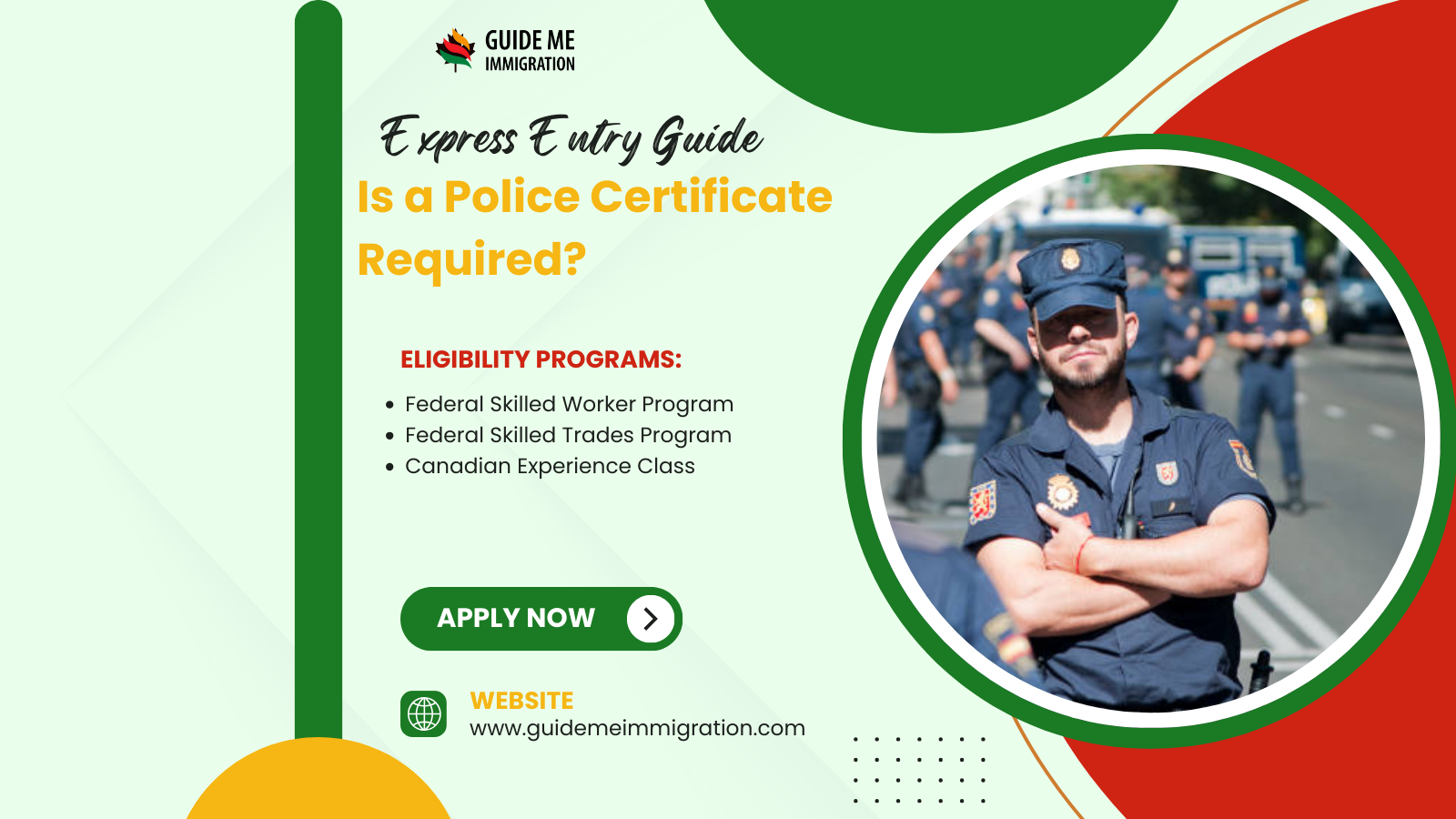Do You Need a Police Certificate When Applying for Express Entry?
If you’re planning to immigrate to Canada through the Express Entry system, understanding the requirements for a police certificate is crucial. This document serves as proof of your good character and ensures that you do not pose a security risk to Canada. Below, we’ll explore everything you need to know about police certificates, including who needs them, when and how to obtain them, and why they’re important in the immigration process.
What Is a Police Certificate?
A police certificate is an official document issued by law enforcement authorities or government agencies. It states whether you have a criminal record or if there are any pending charges against you. This certificate ensures that all applicants meet Canada’s admissibility requirements, particularly in terms of security and public safety.
Who Needs a Police Certificate?
If you’re applying for permanent residence through Express Entry, a police certificate is mandatory for:
- Principal Applicants: Anyone submitting an application for permanent residence must provide a police certificate.
- Spouse or Common-Law Partner: If your partner is accompanying you, they must also submit a certificate.
- Dependent Children (18 or Older): Any dependent child over the age of 18 included in your application will need a police certificate.
This requirement applies to all individuals who have lived in any country for six months or more (in a row) since the age of 18.
Countries That Require Police Certificates
You’ll need a police certificate from:
- Your Country of Citizenship: Even if you have never lived there after turning 18, you still need one.
- Other Countries: Any country where you’ve lived for six months or more consecutively since the age of 18.
If you have lived in multiple countries for extended periods, you’ll need certificates from each of them.
When to Submit Your Police Certificate
In most cases, police certificates must be submitted with your Express Entry application for permanent residence. However, if you’re unable to get one in time, you can provide:
- Proof that you’ve applied for the certificate (e.g., a receipt or tracking number).
- An explanation letter outlining the reason for the delay.
The certificate should be dated no more than six months before you submit your application and must still be valid when the immigration officer reviews your file.
How to Obtain a Police Certificate
The process for obtaining a police certificate varies by country. Immigration, Refugees, and Citizenship Canada (IRCC) provides detailed instructions for each country on its website. Here are some general steps:
- Determine the Issuing Authority: Check which authority in the country issues police certificates. It could be the national police force, a regional law enforcement agency, or a government department.
- Complete the Application: Fill out the necessary forms and provide any required documents, such as identification, photographs, or fingerprints.
- Pay the Fees: Most countries charge a fee for issuing police certificates. Make sure to include proof of payment with your application.
- Submit Your Request: Send your application either online, by mail, or in person, depending on the issuing authority’s process.
- Follow Up: If you don’t receive the certificate within the expected timeframe, contact the issuing authority for updates.
Key Considerations When Applying for Police Certificates
- Timeframe: Start the process as early as possible. In some countries, it can take weeks or even months to receive the certificate.
- Validity: Certificates must be recent and valid at the time of submission. Certificates from your country of current residence are valid for six months, while certificates from other countries may be valid indefinitely, provided you haven’t returned there since the certificate was issued.
- Translations: If the certificate is not in English or French, you must provide a certified translation along with the original document.
Common Challenges and Solutions
- Delayed Processing: If the issuing authority takes longer than expected, submit proof of your application along with an explanation letter to IRCC.
- Unavailable Certificates: In rare cases, some countries do not issue police certificates. If this applies to you, IRCC may accept an explanation and alternative documentation.
- Multiple Residences: If you’ve lived in multiple countries, tracking down certificates from each can be time-consuming. Organize your timeline and start the application process for all required certificates simultaneously.
Why Are Police Certificates Important?
Police certificates play a crucial role in determining your admissibility to Canada. IRCC uses them to assess whether an applicant poses any security or criminal risk. A criminal record does not automatically disqualify you, but it may require additional steps, such as applying for criminal rehabilitation or a Temporary Resident Permit (TRP).
Tips for a Smooth Application Process
- Start Early: Begin the process of obtaining police certificates as soon as you create your Express Entry profile.
- Stay Organized: Keep track of application receipts, correspondence with issuing authorities, and deadlines.
- Seek Professional Help: If you encounter issues, consulting an immigration expert can save time and ensure compliance with IRCC’s requirements.
How We Can Help
At Guide Me Immigration, we specialize in making the Express Entry process smooth and stress-free. Our experienced team can:
- Guide you through the police certificate requirements.
- Help you gather and prepare all necessary documents.
- Address any challenges or delays you may face.
With offices in Canada and Bangladesh, we’re here to assist you every step of the way.
Contact Us
📍 Saskatoon: 535 20th St West, Unit-C, Saskatoon, SK S7M 0X6
📍 Regina: Unit 170 – 2410 Dewdney Ave, Regina, SK S4R 1H6
📍 Dhaka: Apt-2D, H-396, R-6 Avenue 3, Dhaka 1216, Bangladesh
📧 Email: info@guidemeimmigration.com
📞 Call: +1 (306) 700 7440
🌐 Website: www.guidemeimmigration.com
Let us help you achieve your dream of immigrating to Canada. Contact us today to get started!
Other link:http://go-get.ca






